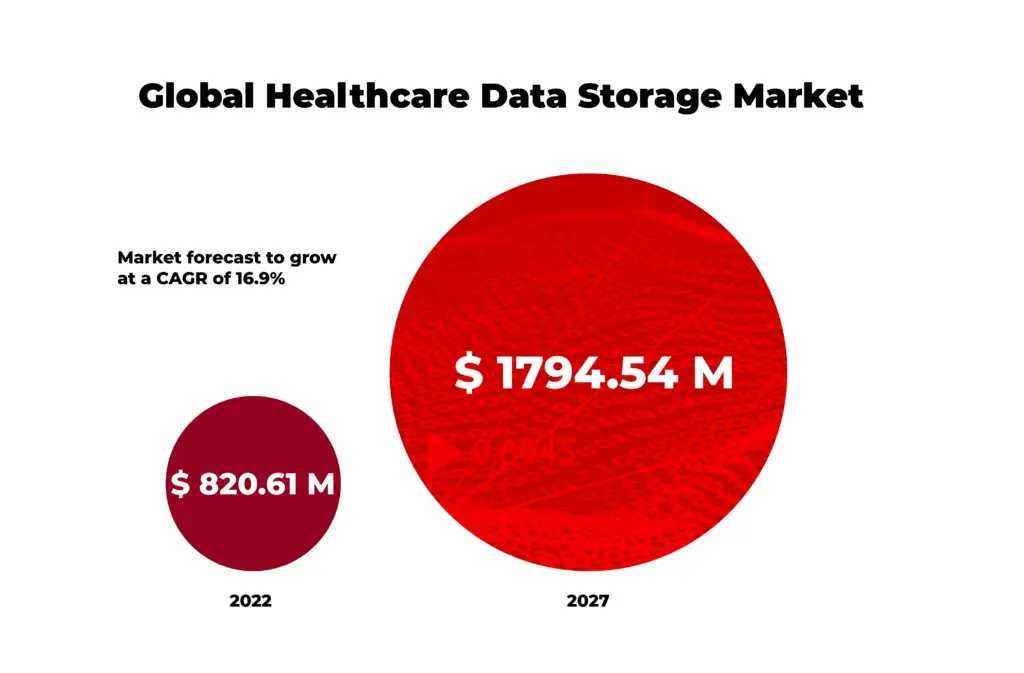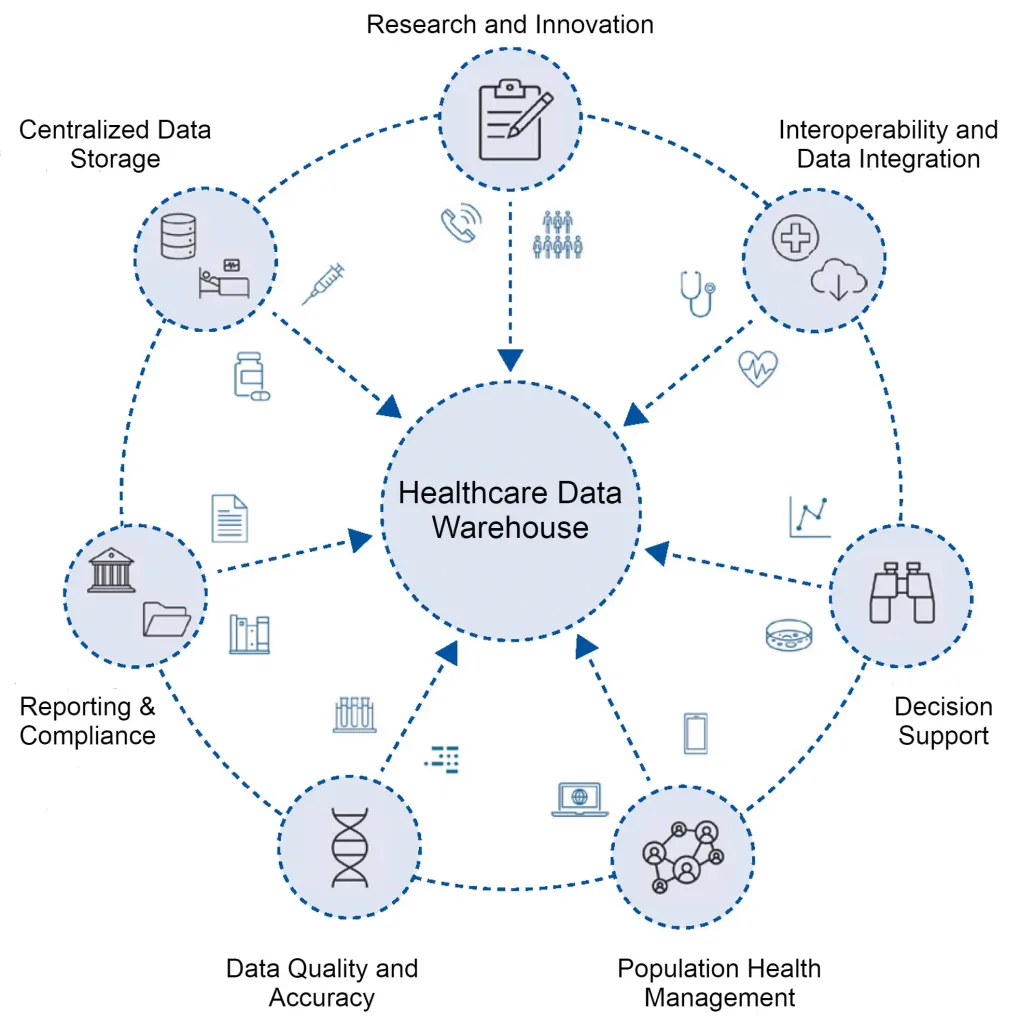Healthcare Data Warehouse: The Modern Way Of Data Management in Healthcare

Healthcare data management is one of the crucial aspects for any type of health-related institution, whether it is a hospital, clinic, pharmacy, health insurance company, or whatever. In fact, 93% of healthcare organizations have experienced a data breach in the past three years, according to Herjavec Group’s 2020. In order to provide a secure data environment, a healthcare data warehouse system integration is a must.
The ever-evolving technology gears up to uplift the game of healthcare data management systems by infusing futuristic technology. It can be blockchain, cloud computing, AI and ML, etc., that helps healthcare institutions detect any unusual data breach activity.
A healthcare data warehouse is an essential tool to integrate with the regular operations of maintaining and handling data. In this article, you will discover the modern way of data management in the healthcare industry.

What is a Healthcare Data Warehouse?
It is a file management system that efficiently handles, organizes, manages, and distributes a wide range of health-related data. A healthcare data warehouse is a present-day modern library where you can instantly search your required data, and within a few clicks, the result is in front of you.
A healthcare data warehouse is a specialized type of data repository designed to store, organize, and manage vast amounts of healthcare-related information in a structured and accessible manner. In the complex and dynamic field of healthcare, data is generated from various sources. It can be electronic health records (EHRs), medical imaging systems, laboratory results, billing records, and more.
As a result, a healthcare data warehouse consolidates these disparate data sources into a unified platform. It enables healthcare organizations to analyze and extract valuable insights for decision-making, research, and improving patient outcomes.
Many leading software development companies build data warehousing for healthcare but be mindful while choosing professional developers, as it is a long-term investment for any healthcare institution. Moreover, the custom software development approach helps you build a maximum number of features and functionalities according to your specifications.
The Importance Of Healthcare Data Warehouse
One key feature of a Healthcare Data Warehouse is its ability to support data integration and normalization. Healthcare data comes in diverse formats, and interoperability challenges often arise due to differences in data standards and structures. A data warehouse addresses these issues by standardizing data formats, resolving inconsistencies, and providing a common framework for data integration.
This allows healthcare professionals and analysts to access a comprehensive and cohesive view of patient information, medical histories, and operational metrics, facilitating better-informed decision-making and enhancing the quality of care.
Security and compliance are paramount in healthcare, given the sensitivity and confidentiality of patient information. Healthcare Data Warehouses implement robust security measures and adhere to regulatory requirements such as HIPAA. This ensures that patient privacy is maintained and healthcare organizations comply with legal standards while leveraging the power of data analytics to improve healthcare delivery and outcomes.
Benefits of Healthcare Data Warehouse

Centralized Data Storage
One of the key benefits of data warehousing in healthcare is the ability to centralize vast amounts of data from various sources into a single, integrated repository. The healthcare industry generates data from multiple channels, such as electronic health records (EHRs), laboratory results, imaging systems, and more.
By consolidating this data in a data warehouse, healthcare organizations can create a unified view of patient information. This data makes it easier for healthcare professionals to access and analyze comprehensive patient histories.
Improved Data Quality and Accuracy
Data quality is crucial in healthcare, where accurate and up-to-date information is essential for providing quality patient care. Data warehousing systems often include data cleaning and validation processes, ensuring that only accurate and reliable information is stored.
Moreover, this improves the overall quality of the data used for clinical decision-making, research, and reporting. Ultimately, it reduces the risk of errors that could impact patient outcomes.
Enhanced Decision Support
Data warehousing facilitates advanced analytics and reporting tools, providing healthcare professionals with valuable insights. Decision support systems integrated with data warehouses enable healthcare administrators and clinicians to make informed decisions based on comprehensive data analysis.
This includes identifying trends, predicting patient outcomes, and optimizing resource allocation, ultimately leading to improved patient care and operational efficiency.
Streamlined Reporting and Compliance
In the healthcare sector, compliance with regulations and reporting requirements is paramount. Data warehousing simplifies the process of generating regulatory reports and ensures that healthcare organizations adhere to industry standards.
By consolidating data in a centralized repository, healthcare providers can streamline reporting processes, saving time and resources. Moreover, it maintains compliance with healthcare regulations such as HIPAA (Health Insurance Portability and Accountability Act) and other regional data protection laws.
Efficient Population Health Management
Population health management involves analyzing and managing health outcomes for specific groups of people. Data warehousing allows healthcare organizations to aggregate and analyze data at the population level, identifying patterns and trends that can inform preventive care strategies, disease management programs, and public health initiatives. However, this proactive approach to healthcare contributes to better health outcomes and cost-effective resource utilization.
Interoperability and Data Integration
Data warehousing supports interoperability by integrating data from disparate sources, including different healthcare systems and providers. Interoperability is crucial for achieving a holistic view of patient health, especially in scenarios where patients receive care from multiple providers or across various healthcare facilities.
By breaking down data silos and fostering interoperability, data warehousing promotes seamless information exchange and collaboration among healthcare stakeholders.
Support for Research and Innovation
Healthcare research relies heavily on access to large datasets for analysis. Data warehousing provides a secure and structured environment for researchers to access and analyze diverse healthcare data.
Additionally, the healthcare data warehouse supports medical research, clinical trials, and the development of innovative treatments and therapies. The ability to query and analyze historical data within a data warehouse accelerates the pace of research and contributes to advancements in medical science.
Major Features Of Healthcare Data Warehouse
Comprehensive Data Integration
A fundamental feature of healthcare data warehouses is their ability to integrate diverse and often complex data from various sources within the healthcare ecosystem. These sources include electronic health records (EHRs), laboratory systems, billing systems, imaging systems, and more.
Moreover, comprehensive data integration ensures that the data warehouse provides a unified and holistic view of patient information. It enables healthcare professionals to access a complete patient history for informed decision-making.
Data Cleaning and Quality Assurance
Healthcare data warehouses prioritize data quality through robust cleaning and validation processes. These processes help identify and rectify inconsistencies, inaccuracies, and missing data.
Furthermore, quality data ensures that the information stored in the warehouse is reliable and accurate. Clean and high-quality data is crucial for clinical decision-making, research, and reporting, minimizing the risk of errors that could have serious consequences for patient care.
Scalability and Flexibility
Healthcare data warehouses are designed to handle the vast amounts of data generated by healthcare systems, and they should be scalable to accommodate future growth. Scalability ensures that the data warehouse can handle increasing data volumes, new sources of information, and evolving analytics requirements.
Additionally, flexibility in data warehouse architecture allows healthcare organizations to adapt to changing technology landscapes and integrate emerging data sources and analytics tools seamlessly.
Advanced Analytics and Reporting Tools
One of the key purposes of healthcare data warehouses is to enable advanced analytics and reporting. These warehouses integrate with sophisticated analytics tools that empower healthcare professionals to derive actionable insights from the data.
Whether it’s identifying trends, predicting patient outcomes, or conducting population health analyses, the inclusion of advanced analytics and reporting tools enhances the decision-making capabilities of healthcare organizations.
Security and Compliance Measures
Given the sensitive nature of healthcare data, security, and compliance are paramount features of healthcare data warehouses. Robust security measures, including encryption, access controls, and audit trails, safeguard patient information against unauthorized access.
Furthermore, healthcare data warehouses adhere to industry-specific regulations such as HIPAA, ensuring that data handling practices comply with privacy and security standards. Compliance features are essential for building trust with patients and avoiding legal repercussions.
Interoperability Standards
Interoperability is a critical feature of healthcare data warehouses, allowing them to interface with diverse healthcare systems and support seamless data exchange.
The integration of interoperability standards ensures that the data warehouse can communicate with different electronic health record systems, laboratory information systems, and other healthcare applications. Moreover, Interoperability promotes care coordination, reduces data silos, and enhances the continuity of patient care across various healthcare providers.
Historical Data Storage and Versioning
Healthcare data warehouses excel in storing historical data, allowing healthcare organizations to analyze trends and changes over time. Versioning capabilities enable tracking and managing changes to the data, supporting retrospective analysis and ensuring data integrity. This feature is particularly valuable for research purposes, as it enables researchers to access and analyze historical datasets for longitudinal studies and outcomes research.
Wrapping Up
Data warehousing in healthcare offers a range of benefits. From centralizing data storage to improving data quality and supporting decision-making, it ensures compliance and fosters research and innovation.
Moreover, as the healthcare industry continues to evolve, the strategic implementation of data warehousing solutions becomes increasingly vital for organizations aiming to deliver high-quality, patient-centered care. These features collectively empower healthcare organizations to harness the full potential of their data for improved patient care and research.



